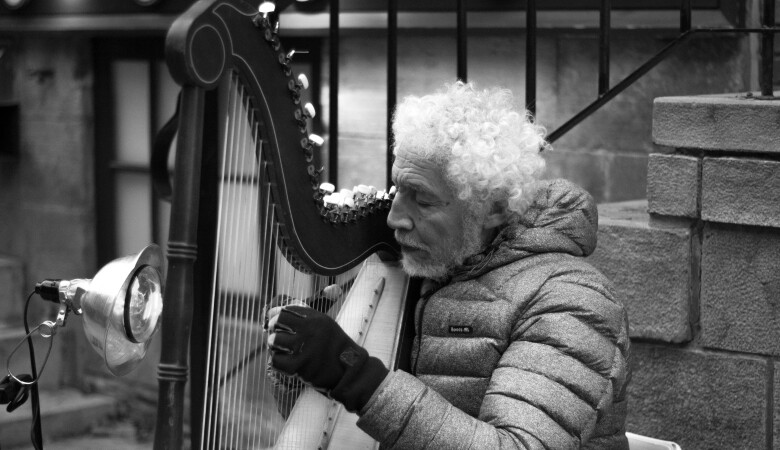Storing Up Heavenly Treasure: Jesus Protects Us From Loss (Matthew Sermon 18 of 151)
May 30, 1999 | Andy Davis
Matthew 6:19-24
Money and Possessions, Heaven
I. A Remarkable Yearly Salary
Please take your Bibles and open them to Matthew chapter six. As we continue in our study in Matthew's Gospel, we are going to look this morning at verses 19 through 24. I like to be amazed by statistics and facts. One of the things that I came across recently was an amazing fact about Michael Jordan. Actually, there are many amazing facts about him, but in 1996, he made $30 million in salary from the Chicago Bulls for one season of basketball, $30 million. Isn't that amazing? For one season of basketball he made $30 million. What is even more amazing is that in 1996, Bill Gates of Microsoft averaged $30 million a day in stock appreciations. Can you imagine that? He made $30 million a day. How would you spend $30 million a day? What does an F16 jet cost? It was something like that. He could buy one every day or a battleship or something. It is just astonishing the amount of money. Now, if you make that much money, I'm not going to ask you to raise your hand if you make $30 million a day. I know how much you love raising your hands. But at any rate, most of us do not have to wrestle or wonder what we are going to do with $30 million a day or even $30 million a year.
And if you are going to get good financial advice, they are going to say you need to start storing up for your retirement. You are going to need to start young, and the younger you start, the more it builds. You have seen this kind of chart and all that. And one of the things you need the most is a good financial planner, somebody who is going to take care of your stock portfolio and see your retirement income building. Now, those of you who are Christians might say, “Well, that is so worldly, just the idea of storing up material wealth. Storing up wealth, that's just a worldly kind of concept. We shouldn't be storing up wealth. We should be living for others. We shouldn't be ambitious in that regard.” Well, the funny thing is Jesus says that is not true at all. You should be ambitious. You should be storing up. The fact of the matter is you will be one way or the other. What Jesus challenges us to do in this text is to be wise in what we store up, to be wise in how we prepare for retirement. And, really, to come to Jesus Christ and say, I want You to manage my retirement portfolio, the one that I get after death, the one that lasts for all eternity.
Look at verses 19 through 24. They say, "Do not store up for yourselves treasures on earth where moth and rust destroy and where thieves break in and steal. But store up for yourselves treasures in Heaven where moth and rust do not destroy and where thieves do not break in and steal. For where your treasure is, there your heart will be also. The eye is the lamp of the body. If your eyes are good, your whole body will be full of light. But if your eyes are bad, your whole body will be full of darkness. If then the light within you is darkness, how great is that darkness? No one can serve two masters. Either he will hate the one and love the other, or he will be devoted to the one and despise the other. You cannot serve both God and money."
II. Overview of Chapter 6
Let’s look at the whole chapter, Matthew six, in context to try to understand Jesus' teaching here. One of the unifying themes of Matthew six is the issue of motivation. What is it that motivates you to do what you do? Now, we've seen in verses one through 18, Jesus talks about your motivation in your religious life. What motivates you, for example, to give to the needy? Is it the applause of man that they may see you and praise you and give you honor as a very generous person? Jesus says if so, “I tell you the truth, they [you] have received your award in full." Remember we talked about it. It's paid in full. You are owed nothing on Judgment Day.
It is the same thing with your prayer life. If you pray so that other people will see you and honor you and respect you for your prayers, you have been paid in full. You sought earthly rewards. That is what you get, and that is all you get. It is the same thing with fasting. In verses one through 18, we see the issue of motivation. This is very key. Are you motivated by an earthly reward, namely the praise of men, or are you motivated by an eternal heavenly reward?
And then in verses 19 through 21, Jesus challenges us to store up treasure in Heaven. There's no question. Right in the middle of the center of the chapter He's saying we need to be storing it up, but the key issue is, again, the motivation.
And then verses 19 through 34, the whole last half of the chapter, has to do with your physical life. What motivates you every day in your physical life? Are you driven by materialism? And then next week, we will talk about anxiety. Are you driven by anxiety, concerned about physical needs? Is that what motivates you or is your eye up in Heaven? Are you thinking about an eternal life up there? That is what Jesus is getting at in Matthew six. And so right in the center here is Jesus' general principle that you should be wise in how you store up treasure. Be wise in how you store up treasure.
III. The General Principle: Be wise in how you store up treasure (vs. 19-21)
He states it negatively. He says, "Do not store up for yourselves treasure on earth." And then He says it positively; "But store up for yourselves treasure in Heaven." Do not do the one but, rather, do the other. Do not store up treasure on earth, but store up treasure in Heaven. Now, what is the underlying assumption here that Jesus is making? You are going to be storing up somewhere. You are going to be storing up something somewhere, and that just comes from life. You get up every day and you put on your clothes. You get up and you energetically move about your day. You are going to be storing something up that day. You are going to be working towards something. The question is what are you going to be working toward? It is the very same thing that Jesus gets to at the very end of the Sermon on the Mount here.
Look at the end of Matthew seven. Jesus says, "therefore, everyone who hears these words of Mine and puts them into practice is like a wise man who builds his house on the rock. But everyone who hears these words of Mine and does not put them into practice, is like a foolish man who builds his house in the sand." Now what's common? They are both building a house. The difference is the foundation and the fate of the house. We will get to that when we get to the end of Matthew seven. But you see the same thing. Every day, you are building something. Every day, you are storing something up. That's Jesus' underlying assumption. And what He's challenging you to do is be wise, be wise in what you do. Be wise in how you store up. Be wise in your investments.
What is so beautiful about Jesus teaching style, and we see it throughout the Sermon of the Mount, is He gives you the principal or the command, and then He supports it with reasons. Isn't that beautiful? He could just tell us what to do. He could just command us. Next week He's going to command us not to be anxious, and He could just leave it at that. But instead, He supports it with reasoning. He reasons us out of anxiety in the same way He does it here, reasoning us out of materialism. And what are His underlying reasons? Well, one is clearly the impermanence of earthly treasure. The impermanence of earthly treasure, "Do not store up for yourselves treasures on earth, where moth and rust destroy, and where thieves break in and steal."
Moth and rust are those things that corrupt that which can be corrupted. Physical stuff around us is corruptible. It can rust; it can be eaten by moths. It can be destroyed. It looks worse 10 years from now than it does now. That is the way it is with stuff. We say, "What about gold? Gold is imperishable." Well, that's not entirely true. You can destroy gold. But you say, "Okay, for the gold then a thief can just break in and steal."
Either way, the things of this life, the material things of this life that people put so much value on are impermanent. "Don't work toward them. Don't store them up", he says, "Where moth and rust destroy, and (then) where thieves break in and steal." And why is this? It is because of the inherent weakness of this material world system. It is a waste of your life. And Jesus does not want you to suffer that loss. He does not want you to get up every day and invest second after second, minute after minute, on that which means absolutely nothing, but instead to invest in something that will last.
And so the second reason is the permanence of heavenly treasure. "But store up for yourselves treasure in heaven" Jesus says, "where moth and rust do not destroy and where thieves do not break in and steal." In other words, anything you commit up to heaven, anything you cast up to Him, up to God, lasts forever. Nothing can destroy it. It is a place of incorruption. Incorruptibility is what heaven is all about. Nothing decays there. Nothing is destroyed there. And it's a place of invulnerability. It is a fortress or a citadel that cannot be attacked. There are no enemies inside the walls and there are not even enemies outside the walls. There's no danger whatsoever that the fortress of heaven can be breached and the treasure can be stolen. Absolutely secure.
But the ultimate motivation or the ultimate issue here is the state of your heart. Now, any of you who have been listening to this preaching through the Sermon on the Mount understand how much Jesus is going consistently for your heart. That's what He wants. That is what He's yearning for. That's what He made. And He wants your heart to worship God. And so Jesus says, "Where your treasure is, there your heart will be also." What you value the most is what you will think about. Isn't that true? What you place highest value on is what you spend your time thinking about, what you ponder. Perhaps for some of you, you value your job the most or your house or some prized possession. Perhaps you value your children or your family, your spouse. These things are things that people put value on. But what you value the highest is what you will think the most about. You ought to keep a record of your thoughts and see how often you think about God, the Father. How valuable is He to you? How valuable is heaven to you? Jesus says, “where your treasure is, there your heart will be also.”
Now your heart, remember we talked about the heart? The heart is not that part of you that pumps blood. No, it is that part of you that thinks, that part of you that feels, that plans, that has a will, that internal part of you. And wherever your treasure is, that part of you will be consumed by it. And that is what Jesus says, and that's a real issue here. Materialism or anxiety about physical things can take over a heart; it can crowd out thoughts of God. And then Jesus is saying, “[No,] set your hearts on things above,” just like the Apostle Paul says in Colossians three.
IV. The Biblical Doctrine of Rewards, Both Earthly and Heavenly
Now this brings us very much to the issue of the biblical doctrine of rewards- the biblical doctrine of rewards. "Where your treasure is", Jesus says, "There your heart will be also." I have given a lot of thought to this. There are lots of rewards around. All you have to do is watch television to see how many things there are that you can be rewarded with. Like a BMW, the ultimate driving machine. Wouldn't that be something to sit in a BMW, the ultimate driving... I'm not sure I'm worthy of that. I mean to sit behind the wheel of the ultimate driving machine. But of course, Preference by L'Oréal tells me I'm worth it so, but that's only for women. You're worth it, you know. So I don't know how much it is. Is that expensive? It probably is. If they have to advertise that you're worth it, it must be expensive. But there are all kinds of enticements to material rewards, aren't there? Nearby where I used to live up in New England, in Newport, Rhode Island, there are a bunch of mansions up there. I don't know if any of you have been up to Newport, but there are a bunch of mansions built by Robber Barons. People who are railroad magnates and all that and they just became incredibly wealthy at the end of the 19th century, and they built mansions with gold bathtubs. Would you like to take a bath in a gold bathtub? Wouldn't that be something? Or would you like to look at a fire surrounded by a gold-encrusted hearth? Or to look at a chandelier where instead of just glass, there are actual diamonds cut in there, wouldn't that be something? You have to pay $6.50, at least you did five years ago, just to look at it, just walk through. That's how expensive it is.
So there are all kinds of material inducements in this world, material rewards. Well, the Christian says, “that whole thing is unseemly. I don't want to think about rewards. I'm going to be a mature Christian and I'm not going to do anything for reward. I'm just going to serve God. And I'm going to love my fellow man, and I'm not going to be concerned about what I get out of it. I don't want to do it for that reason. I just want to serve God.” And so we tend to think of rewards as something that's dirty or something that's somehow bad.
There was a resolution made by Jonathan Edwards. He made a series of resolutions when he was just 20 years old and they still challenge me today. Listen to this one, "Resolved to endeavor to obtain for myself as much happiness in the other world as I possibly can with all the power, the might, the vigor, the vehemence, yay, even violence I am capable of." He's saying, “I'm going to live every day to gain as much pleasure for myself in the next world.” You say, “That sounds unchristian.” No, that's exactly what Jesus is telling us to do. “Store up for yourselves treasures in heaven,” He says. Live for it every day. So I said, “Well, what is this treasure? What is it that we're storing up?” And so I started to look at the idea of rewards.
Now if living for rewards is selfish, if it is basically evil, then why does Jesus motivate us to do it? We looked at this last time, remember? Matthew 5:12. To the persecuted, those who are suffering persecution, what does he say? "Rejoice and be glad because great is your reward in heaven for in the same way they persecuted the prophets who were before you." Jesus is clearly motivating by rewards.
Matthew 5:46. "If you love those who love you, what reward will you get?" There He does it again, motivating by rewards. Here in Matthew 6:1, “If you do,” it says, “be careful not to do your acts of righteousness before men to be seen by them.” Why not? Well, if you do, you'll get no, what? “Reward from your father in heaven.” You don't want to lose your reward. So don't live for earthly praise. And then as I've mentioned, Matthew 6:2, 5 and 16, He says time and time again, “Truly I say to you they have received their reward in full." In other words, there's nothing going to be owed to them on judgement day for those good works. They did them for the praise of men and they got the praise of men, and that's it. And then here in Matthew 6:20, “store up for yourselves treasures in heaven.”
If Jesus did not want us motivated by rewards, why does He do it so consistently? It is because he does want us to be motivated by rewards, but the right reward, and therefore the contrast is not between living a selfish life and an unselfish life. It has nothing to do with that. The contrast is between living a foolish life and living a wise life. A foolish person lives for rewards that disappear. They go away. But a wise person lives for rewards that will last through all eternity, for all eternity.
I was reading a book recently by a pastor named John Piper, and he gave a beautiful illustration of the futility of living for material rewards. He said, suppose, for example, you were going with a friend of yours to a major art museum, let's say, the Metropolitan Museum of Art in New York, and you are walking down a wing of the museum and you are with your friend and he looks over and says, "That's a nice looking painting over there. As a matter of fact that's a beautiful looking painting. I think that would look great in my bedroom." So he steps across the cord in there and takes the thing off the wall, puts it under his arm and you are standing there aghast. Your eyes are as big as saucers, and so you continue, or at least he does, and you are just standing their motionless and then he sees a little statue over there. He says, "Boy, that looks good. That's a good looking statue. I think that would look good on my mantelpiece." So he takes it and he has the painting in one arm and the statue. Finally, you just can't contain yourself anymore. You say, "What are you doing?" "Well, I'm becoming an art collector. Everybody should be an art collector. That's what I'm doing. I'm collecting art. Don't you like this painting? Or do you think there would be a better one for my room?" "You're crazy. They'll never let you get out of here with this. They're going to come and arrest you if you don't put that back immediately. Good thing I'm the only one that saw you."
Is there any difference at all between that and materialism? People are moving through this life, collecting things off the walls. They are not going to let you get out with it. You are going to have to leave it at the door. It belongs to this world order. You're supposed to be living for the next world. I don't see any difference at all. We have a lot of art collectors around us all the time, don't we? Why do we live for material things? That's not what they are there for.
We are supposed to be moving as aliens and strangers in this life, God says, taking the material things of this world, holding on to them loosely saying “What do you want me to do with this, God? You handed it into my hand temporarily.” Well, put it over here and do this with it, build the Kingdom. And to think of becoming an art collector like the illustration. I just laughed out loud when I saw that.
But then I started thinking about the issue of what rewards are. What is the standard way of looking at rewards? What do you think of when you think of heaven? I heard an old, old story or I heard about a mansion He has built for me in glory. Have you ever thought about your mansion in glory? I think this is how people tend to think of it. If you are really good, if you are saved by grace and we know that rewards, by the way, the reward is not forgiveness for sins. We are all instructed Protestants, aren't we? We know that good works do not pay for sin. I just have to say that every week. You cannot use your good works to pay for sin. Only the blood of Jesus Christ can do that. But once you are saved, now you are supposed to do good works.
Ephesians 2:10, “We are His workmanship created in Christ Jesus to do good works, which God has prepared in advance for us to do." So we are supposed to be doing good works every day. Some of us are more obedient than others. Some crank out more good works than others. Supposedly, they make it through the issue of the motivation. You are doing it to serve God, and now you have a whole pile of good works. Well, what does it buy you? It buys you a better mansion in heaven than the guy who didn't do as many. Have you ever thought that way? That is what some people think. In other words, you get this big kind of living accommodation whereas the other people live in the poor side of town in heaven. It is a very materialistic way of looking at heavenly rewards. Or maybe you get five gold crowns, whereas the other guy only gets three or one. Or you get lots of jewels in there. Well, I don't know, the whole thing made me feel uncomfortable.
I said, “This doesn't seem like a right way of thinking about rewards.” So I began to think again about Matthew 6:21. “Where your treasure is, [what?], there your heart will be also.” So the treasure is something that you are supposed to set your heart on, something you are supposed to focus on. Now, do you think that Jesus would ever entice us to idolatry? That He would entice us to think about mansions, streets of gold, pearly gates, rather than God Himself? He is enticing us to a reward which is intimately connected to the Heavenly Father. Would He do anything other than that? Your rewards are connected, I believe, to the Heavenly Father. That is what I think the rewards are.
You are saying, "Well, I don't understand." Let me see if I can explain it. Hebrews 6:10 says this, "God is not unjust; He will not forget your work and the love you have shown Him as you have helped His people and continue to help them." What does it say there? That it would be unjust for God to forget each of the things that you've done. God won't forget them. You may forget them, probably you should forget them, so you don't get some ego trip, that you're such a righteous person. But, God will never forget what you have done to serve Him. Anything done for God, He will make note of it, and He will remember.
And then on that great day of judgement, Revelation 20:12, it says, "I saw the dead, great and small, standing before the Great White Throne, and the books were opened…. And the dead were judged by what they had done, as recorded in the books." Now, we know that all of us have sinned, but our sins have been blotted away. If we have faith in Jesus Christ, our sins have been washed away, through the blood of Jesus Christ. There is no other forgiveness for sin. But then, what of the good deeds? God has recorded them, He has noted them, He has not forgotten one, and He will repay. He will give a reward.
1 Corinthians 4:5 says, "He [The Lord] will bring to light what is hidden in darkness and will expose the motives of men’s hearts. At that time, each will receive his praise from God." There it is: praise from God is the reward. Praise from God. It is not a bigger mansion than the other guy. It is praise from God for the good deed that was done.
1 Corinthians three says this, "No one can lay any foundation other than the one already laid, which is Jesus Christ. If any man builds on this foundation using gold, silver, costly stones, wood, hay, or straw, his work will be shown for what it is, because the Day will bring it to light. It will be tested with fire, and the fire will show the quality of each man's work. If what he has built remains, he will receive his reward." There is that word reward again. “He will receive his reward. [But,] if what he has built burns up, he will suffer loss. [He will suffer loss.] Yet, he himself will be saved, yet as only as one escaping through the flames."
V. The Danger of a Lost Reward: Materialism (vs. 22-24)
Now, I don't know if you noted the subtitle of my sermon here, 'Storing Up Heavenly Treasure' Jesus protects us from what? Loss. He protects us from loss. He doesn't want you to suffer that loss. He wants you to live every moment, so that on that day, there will be a whole pile of works done righteously. Those are the works that are done for God. They are the works that are done for His glory, to build the kingdom. “We are His workmanship, created in Christ Jesus, to do good work, which God prepared in advance, for us to do.” There will be a whole pile of them. So that loss is what Jesus is protecting us from.
The works, in other words, the good deeds, lead to praise from God. This came down to what I think is the most significant verse on this entire issue, and that is Hebrews 11:6. As a matter of fact, it is so important, that I printed it out for you. Take your little insert here, and look at it. Now, Hebrews 11 is a great chapter. Maybe one day, under the providence of God, we will have a chance to go through it, but it's just called the 'faith' chapter. If you want to learn about faith, you go to Hebrews 11. But I printed it at the bottom here, so you wouldn't have to turn. It just says this, Hebrews 11:6, "Without faith, it is impossible to please God.” “Without faith, it is impossible to please God, because anyone who comes to Him must believe, [number one,] that He exists. [And number two, what?] that He rewards those who earnestly seek Him."
You have to believe two things in order to come to God. You must believe that He exists, and that He is a rewarder of those who earnestly seek Him. You have to believe that God rewards. This is a very important verse. You can't just dispense with rewards as though they are not important. They are intrinsic to faith. It is intrinsic to faith to believe that God is a rewarder of those who earnestly seek Him.
But, I think we have had a too materialistic way of looking at what the reward is. What is the reward? It is God, Himself. What does it say? You must believe that He exists, and that He rewards those who earnestly seek what? Him, He's what you get. And this is the image I get. With your life, you are weaving a tapestry. Every day, you put in a thread, maybe a gold one, a blue one, a purple one. You are weaving together a picture. When I was in Pakistan, I saw these Persian rug weavers. They had come over there from Iran, and were working there in Pakistan. And they did incredible work. Tiny little knots made one at a time. And with every action, every moment, you are making a little knot, and putting a rug together.
Now, when Judgement Day comes, your rug is purified if you are a Christian. Anything that was not done for the glory of God, anything done for selfishness, etcetera, God will purge it out. But, then what is left? He will sit down, and look at this purified rug, and He's going to go over every single knot to encourage and praise you. That is your reward. I imagine He will go through it this way, "May 29, 1999. You got up. No one else was up yet, and you got down on your knees and prayed. Nobody talked to you, nobody saw you; you didn't do it to be praised by anyone. You didn't tell anyone about it. You just did it, because you wanted to pray to Me, and to build my kingdom. Well done, good and faithful servant. Good job. That brought Me pleasure, and now I am sharing My pleasure with you. And then an hour later when you saw your spouse, you encouraged her or him. You encouraged her. And, you said a word of praise to her, so that she would be faithful and strong in her walk with me. Good job. Well done, good and faithful servant." Every single act is noted by God, and in Heaven He brings you into His pleasure with that. And your pleasure becomes His pleasure, His pleasure, yours. You see the strength of the relationship. It is not that you get a bigger mansion than the other guy. It's that God shows you all that He did through you. For, it says in John 3:21, "Anyone who is born of the light comes into the light, so that it may be seen plainly, that what He has done has been done through God." Everything was done through God, but then He opens it up, and you see the pleasure of God in those acts. That's the reward. Those are the rewards, plural. Every single moment noted, purified, and praised by God.
Don't you want that? Don't you want to live for that? Don't you want to store up as many of those as you can? So that today, every moment, you could live for the praise of God and the pleasure of God. It says in Ephesians that we should find out what pleases the Lord and do it. Please Him, and do you think that He will let you in on His pleasure here on Earth? A little bit. He'll give you a sense of the Holy Spirit inside you, comforting you saying “Good job, keep going.” But it's not the full pleasure yet. You'll see that in heaven and He'll just open wide at that point and show you His pleasure in the life you've lived. That's the reward.
And Jesus does not want you to lose one of them. Not one of those moments does He want you to lose. He wants you to have it all. And so He wants to protect you and so He's going to protect you from materialism here, next week from anxiety. And why does He protect you? It is because materialism and anxiety cause you to turn away from the Kingdom of Heaven and start working on earthly things. And you will waste that time; that section of your life will be barren of fruits. He does not want that to happen.
And so He says in Verse 22, "The eye is the lamp of the body. If your eyes are good [or single], your whole body will be full of light. If your eyes are bad, your whole body will be full of darkness. If then the light within you is darkness, how great is that darkness!" Jesus here talks about the single eye. Now is this a warning for Christians? Yes, it is. It is a warning for those who are members of the Kingdom of Heaven, who are disciples, that we should not have a "double eye". It says in the NIV, if your eyes are good, a better translation would be if your eye is single, if you have a focus, a concentrated focus. And Jesus does not want us, His disciples, to waste our time, to waste our resources on anything less than the Kingdom of Heaven.
Do you remember the story of Rumpelstiltskin? Rumpelstiltskin, that weird, twisted little man in, I think it's a Grimm's Fairy Tale. And there was this miller who had a daughter and he boasted about his daughter that she was able to... You remember what she could do? Turn straw into gold. Well, it couldn't be done, and so she was locked up in a room full of straw and she had to turn it into gold. She didn't know how to do it. And then Rumpelstiltskin pops up and says, “I know how to do it. I know how to turn straw into gold. But you have to give me your first born.” Remember that whole story?
Well, I'd like to not focus on the issue of Rumpelstiltskin, but the issue of turning straw into gold. That's the way I look at it. Every moment, this day is given to me, and I can turn it up into something eternal. Some reward for God. Anything, any moment, an interaction with a Non-Christian at Kroger, I can talk to them about God. And it's just a regular interaction unless I redeem it and turn it into something. Paul says that we should redeem the time because the days are what? They're evil. And so it's kind of like you are given a bunch of straw, and God, supernaturally, asks you to weave them into heavenly gold. By His Spirit, you can do it. Every moment can be used, if you take it and live it for God. You say, “God, what do You want me to do today? What do You want me to do as I walk into Kroger? What do You want me to do as I walk into church? What do You want me to do now that I've woken up this morning? What should I do?” “Live for Me. Do what I command you to do. Walk with Me and you'll turn the straw of moment by moment by moment, into heavenly gold, which can never be taken away from you.”
But the problem is materialism, it creeps in. In Matthew 13, in the Parable of the Seed and the Soils, it says, "The one who received the seed that fell among the thorns is the man who hears the word, but the worries of this life and the deceitfulness of wealth choke it, making it unfruitful." Oh, that you would not be unfruitful!
Do you know it is possible to be a Christian and be unfruitful? Oh, that you would not be unfruitful. But, did you hear what it said? It said the worries of this life and the deceitfulness of wealth. Isn't that Matthew six in reverse order? We get to the deceitfulness of wealth first. We get to the worries of this life next. Both of them choke out the seed so that it is not fruitful. Both of them choke it out. I don't know much about gardening except this, I can kill anything. There's no plant that I'm not fully capable of killing. I even once killed a cactus. I don't know how you can do it, but when I got it I did some various things. I don't know if I over-watered it, under-watered it, put it in the... I don't know. But I've been told it's very difficult to kill a cactus. But I did it.
But at any rate, I asked somebody recently, “Alright I don't know that much about gardening, what is it about? Why do we need to weed a garden?” He said, "Well, we weed a garden so that it looks good.” No, no, no, you don't weed the garden so the garden looks good. You weed the garden because the weeds soak up nutrients and water that are meant for the plants. It's a waste, a waste of resources. Furthermore, according to the parable, the thorns grow up and choke out the plant. In other words, the thorns get bigger, and they block the sun, so that the sun can't get through. It's just a total waste of resources. And so there's no fruitfulness. There’s no water and nutrients flowing through the vines into the tomato, or into whatever it is you're growing. There's no fruit.
Worries of this life, deceitfulness of wealth choke it. Why? Because you then turn and start putting your resources towards something that is not the Kingdom of Heaven. You are wasting your life. And therefore there's no fruit. And so Jesus says, "I want you to have a single eye."
Do you remember back in 1992 in Barcelona? Do you remember the big Olympic flame? Do you remember how it was lit? Do you remember? There was an archer. And do you remember that man, I think he was Spanish, and he had some problem walking, but he was an incredibly skillful archer. And the only thing that I remember was that he pulled that thing back, the camera focused in on his face, and the concentration was incredible. So also was the pressure. How many people do you think were watching that guy shoot that arrow? Would you like to shoot an arrow high up across something and three billion people be watching you? And if you miss, left or right, boy, it doesn't look too good. So he concentrated with a single eye on the target. And it flew over there and hit just beautifully, it was just perfect. You remember that, the flight of that arrow, just beautiful.
Well, Jesus is calling on us to have a single focus, a single eye, The Kingdom of Heaven. We'll talk about it next week. Seek first the Kingdom of Heaven and His righteousness, and all these things will be added to you as well. Single focus protects you from loss. So does a focus on a single master. “No one can serve two masters. Either he will hate the one and love the other, or he will be devoted to the one and despise the other. You cannot serve both God and money.” You have to choose. Both money and God force the choice.
Ultimately, God is a jealous God. He is going to crowd out everything that's not God. Money is a jealous god. It will crowd out God from you. You have to choose. And so the issue again comes to the heart. “Either he will hate the one and love the other, or he will be devoted to the one and despise the other.” Materialism chokes out love for God. You love your house, you're living for your house, you're living for your career, or you're living for anything earthly. It chokes out love for God and love for His Kingdom.
VI. Application: Stewardship of the Heart
So what is the application for us? It is very plainly, a matter of stewardship. Each one of you is a steward. You are a servant committed to watch over certain resources. The resources are, some of them intrinsic to who you are, your good clear mind, your physical body and strength, your gifts, your spiritual gifts, all these things have been committed to you temporarily. They are yours for a little while. On judgement day, God is going to want them back, so give them back. And then let's see what you did with them. He's going to demand an accounting from you. And judgement day is coming very soon and Jesus wants to protect you from loss on that day.
Now, the ultimate loss is the loss of your soul. I've been saying, and I'll say it for the third time, good works never pay for sin. They never pay for sin because God expects them anyway. There is only one thing that can wash away sin and that is faith in the blood of Jesus Christ. But once you have faith in Jesus Christ and you start storing up works, Jesus wants to protect you from loss. Protect you from loss through hypocrisy, namely doing good deeds to be seen by men. We don't want to lose it. We don't want Jesus to say, "Truly, I have said to you, you have received your reward in full." He protects us from loss from hypocrisy. Also loss from materialism, that we're taking and wasting our lives building a bigger house, building a bigger this, bigger that; bigger barns to store up more. What a waste. He's protecting us from loss through materialism. Next week He'll protect us from loss through anxiety. But He wants us to have our full reward.
And so, what you need to do is take an inventory of your resources. Take an inventory of who you are yourself, personally. What has God given to you? And what spiritual gift has He given to you? What time does He give to you? He has not promised any one of you tomorrow, has He? You have today. Serve God today fully, and then by His grace, He'll give you another day if He wills. Serve Him again tomorrow, with your time. And take your talents, each one of them, and use them for the glory of God, for the building of His Kingdom. Take your treasure, your money, and use it for the building of the glory of God, for His Kingdom.
Now serving God very practically in a local church takes time, doesn't it? There'll be people, your brothers and sisters here calling you, and encouraging you to teach in the Sunday school program. You shouldn’t answer quickly. Pray about it. There'll be other people who will be challenging you to serve in other ways, with the outreach ministry for example, or with hospitality in some way. Maybe you have a gift of administration. Don't answer quickly. Eternal reward is hanging in the balance. What will you spend your time on this week, this month, this year? Will you spend it building the Kingdom of God? If so, you're going to do it in a local church just like this one.
So take these matters and pray over them and make sure that you don't suffer the loss that Jesus is trying to protect you from. That on judgement day, He will say to you time, and time, and time, and time again, "Well done, good and faithful servant, [well done, that was well done. Praise goes to you, because you lived faithfully.]" And you give it right back to Him and say, "God, through your strength, you enabled me to live faithfully". Let's pray.






























